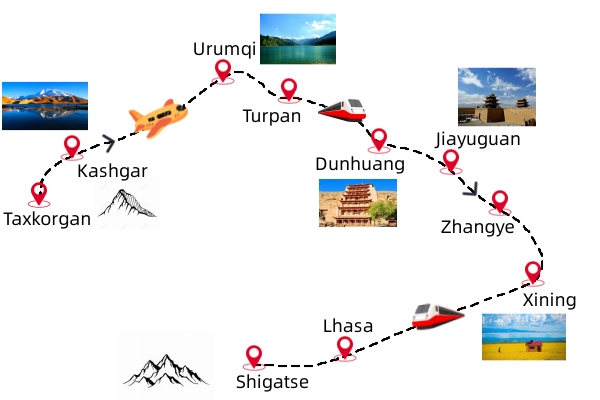20 Good Ideas To China Famous Food Destinations
20 Good Ideas To China Famous Food Destinations
Blog Article
Top 10 Tips For Dealing With copyright Items When Shopping In China
1. Know the High Risk ItemsTip Branded items such as watches, bags electronics and designer clothing are frequently counterfeited. They must be considered with care.
Pro: Aids you to identify fake products.
Con: Can cause suspicion about authentic products if there is no adequate knowledge.
2. Search for authentic product details
Choose a retailer you know well. Know the details of their branding, materials, and stitching.
Pro: Enhances your ability to detect subtle differences between genuine and fake products.
Cons: It may take a long time to understand new products, especially when they're not used to them.
3. Trusted Stores
TIP: When buying expensive products be sure to buy from brands that are official or trusted malls like Beijing's China World Mall or Shanghai's Plaza 66.
Pro: Product authenticity is guaranteed, and comes with receipts and warranties.
Pro: Some products cost more at the market on the street or in smaller shops.
4. Check Labels and Tags
Check for any typos, irregular fonts, or poor quality materials in packaging and tags.
Pro: A quick method of identifying poorly manufactured counterfeits.
Contraints: Fake items can be of superior quality and closely resemble those of the original which makes them difficult to distinguish.
5. Beware of "Too Good to Be True", Costs
Tip: Extremely low prices for items that are considered luxury are a red flag. Real luxury goods rarely sell below their retail prices.
Pro: Stay clear of obvious scams.
Con: Some vendors use moderate pricing to make counterfeits look more convincing.
6. Demand Certificates for Authenticity
Tips: Ask for authentic documents for items such as antiques, jade and branded products.
Pro: More confidence for your purchase.
Con: Since certificates are forged This method of authentication isn't foolproof.
7. Check before purchasing
Request that high-end electronic devices and other products test before you make the purchase.
Pro: Assists in confirming functionality and high quality.
Cons: The seller might not permit testing or the tests may only be superficial.
8. Avoid Buying Antiques Without Expertise
Tip: Genuine antiques require an extensive understanding or a professional's confirmation. You should avoid buying antiques unless you are certain they are authentic.
Pro: Lowers the chance of being scammed with copyright or fake.
Cons: You could be missing out on visually appealing, but not authentic ornaments.
9. Utilize a Local Guide you can Trust
Tips: Contact an expert in your area, or ask a person who is familiar with your market to help you identify reliable vendors.
Pros: It saves time and reduces risks when shopping in untested markets.
Cons: Some guides may charge a fee or a tip, which will increase the cost of your trip.
10. Be Faithful to Your Instincts
Tips: If you are feeling off--be it the vendor's attitude or product's quality or the cost, just walk away.
Pro: Prevents you from making costly purchases that you regret.
Con: Over-cautiousness might lead you to pass on legitimate deals.
Benefits of avoiding fake products
Durability: Authentic items last longer and provide the best value for money.
You can rest assured that you won't be scammed or swindled.
Legal Safety: Some nations penalize travellers who bring returned copyright products.
Reputation of the Brand: Genuine products help to maintain moral business practices.
Cons of Avoiding copyright Goods
Higher Costs: Authentic products are typically more expensive.
A small number of genuine products are available at small stores or in street markets.
False bargains: Some fakes offer high quality and great value at a low price.
If you follow these guidelines, you can navigate the shopping experience in China confidently and make educated decisions about purchasing authentic or replica products. Read the top see details about this location for more examples including the color of dress in china, chaotianmen dock%EF%BC%8C a major water transportation hub in chongqing, shopping in fuzhou, shenzhen golf club, great tang all day mall xian.html, four great classical novels.html, anren ancient town, shopping in macau, lijiang tour maps, binhai aircraft copyright theme park in tianjin and more.
Top 10 Tips To Tipping In China
1. Be aware that tipping is not CustomaryTip - Tipping in China is not a common practice, particularly in smaller restaurants and local restaurants.
Pro: It's cost effective and conforms to the norms of culture.
Cons: Travelers who have a habit of paying a tip in their countries of origin may feel uncomfortable.
2. Check for service charges
Tipp: Many luxury restaurants and hotels charge a the service charge (10-15%) in the total bill. It is therefore not necessary to tip.
There is no need to include a tip or calculate.
Cons: Service charges are not always clearly stated.
3. Tip Only When Appropriate
Tipping is expected in tourist areas and in international hotels. This applies to tour guides, hotel staff, drivers and other hotel employees.
Pro: A small gesture of appreciation can show your appreciation for the exceptional service you received.
Cons: Inconsistent practices may result in confusion regarding how much to tip.
4. Don't offer tips to other people.
You can tip subtly so as to keep from making the recipient feel uncomfortable.
Pro: Prevents unwelcome attention or embarrassment.
Con: Some people may not accept the tip, which could lead to awkward situations.
5. Make use of cash for tipping
Tip: If tipping is appropriate, consider using cash rather than adding it to your bill, since many payment methods in China do not have an option to tip.
Cash is accepted all over the world and it's a breeze.
Cons: It is required to carry small amounts of cash, which could be inconvenient.
6. You could also offer tips to businesses that cater for tourists
Tipping is common in places where Western tourist are frequent like foreign restaurants, or with guided tour guides.
Pro: It is in line with the requirements of service providers that are comfortable with Western practices.
Cons: Encourages tipping when it's usually not necessary.
7. Avoid Tipping Taxi Drivers
Taxi drivers are not accustomed to being paid tips. If needed, you can round the fare for your convenience.
Pro: Shows you're willing to adhere to local customs.
Con: In areas other than tourist destinations, rounding-up may be misunderstood to mean a tip.
8. When Tipping your Tour Guides
Tips: For private or group tours, tipping the driver and guide is standard particularly in cities like Beijing or Shanghai. It is common to tip tiny amounts in the range of Y=50 to 100 Y.
Pro: Reward and recognize good service.
Cons: Sets expectations that future tourists will be more generous with their tips.
9. Avoid Over-Tipping
A modest amount (5-10% is enough) is sufficient. Tips that are large can be viewed as excessive or unnecessary.
Pro: It keeps you from spending too much, or inflicting a negative impression on your neighbors.
Con: If you are used to tipping generously, holding back may feel uncomfortable.
10. Research Ahead of Time
TIP: Be aware of specific tipping practices within the area or at the establishment before arriving. Certain provinces, businesses, or other establishments catering to foreigners may have different expectations.
Pro: It will aid you in learning local customs so that you don't get confused.
Con: Takes time to research each region or location in isolation.
Pros of Tipping Practices in China
Save money: By not having to leave a tip, you'll cut down on your expenses overall.
Cultural Adaptation : Harmonization with the traditional ways of life as well as promoting respect and integration.
Simplicity: Eliminates the necessity of calculations or carrying around cash.
Encourage service providers to concentrate on quality rather than advice.
Cons of Tipping Practices in China
Tourists who aren't familiar with the culture: Travelers from tipping cultures may find it hard to adjust.
An awkward situation giving a gratuity in the wrong manner could lead to confusion or cause discomfort.
Tourism has led to an increase in the expectations. In some areas, tipping is common.
Missed Thanks: Tipping allows certain travelers to express their gratitude. However, the absence of a tip may make them feel unimportant.
Use these guidelines to ensure respect for the culture as well as a great dining experience. Follow the best check out this top tourist destination for blog recommendations including jiuzhaigou, eating in lanzhou, chinese wood carving originated in neolithic period, wuzhi mountain wuzhi shan five finger mountain, lijiang tour maps, wuzhi mountain wuzhi shan five finger mountain, eating in shangri la, taishan, zhangjiajie tour maps, lijiang tour maps and more.